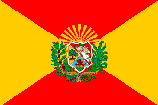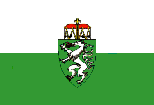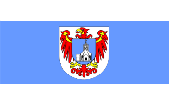- IBERIAN CROSS
- See cross of calatrava.
- IMPALE
- 1) (v) In heraldry a term for the marshalling (or placing) of two sets of
arms side-by-side on a shield or banner of arms to indicate marriage or alliance
empale (see also coat of arms 2),
dimidiated and entire')
- 2) (v) On flags as above, but the images placed on a flag need not be arms
as defined herein.
|
![[impaled flags]](../images/v/vxt-d173.gif)
Flag of Overassel, Netherlands (fotw)
|
![[impaled flags]](../images/v/vxt-d173a.gif)
Flag of The Orkneys, UK (fotw);
|
![[impaled flags]](../images/v/vxt-d173b.gif)
NY & NJ Port Authority, US (fotw);
|
![[impaled flags]](../images/v/vxt-d173c.gif)
English Naval Jack Royalist - 1643 (CS)
|
- IMPALE(D) BY DIMIDIATION
- See dimidiated and following note.



Flag of Lehe, Germany (fotw); Arms and Flag of Kaly. Czech Republic (fotw)
- IMPERIAL DRAGON FLAG
- See dragon flag 2).
- IN ABEYANCE
- The term used when a flag or office is no longer in current use, but which may be re-introduced at some
future date with examples being the rank flag of Marshal of France (which office has no extant holder) and
the broad pennant of a commodore first class (a rank in abeyance since 1958) see also
broad command pennant 1) and
rank flag 1)).


Rank Flag of a Marshal of France (fotw); Former First Class Commodores Broad Pennant, UK
- IN BASE
- The heraldic term used when a charge or charges appear in the lower part of a shield, banner
of arms or flag that is otherwise undivided see
base 1) (also
abased,
banner 1) and
shield).
- IN BEND
- The heraldic term used when an object, charge or charges on a shield or banner of arms are placed diagonal from
top left to bottom right across the field (see also bend in appendix VI
and per bend).

Chief of Naval Staff, Italy fotw)
- IN BEND SINISTER
- The heraldic term used when an object, charge or charges on a shield or banner of arms are placed
diagonally from bottom left to top left right across the field (see also bend sinister in
appendix VI and per bend sinister).

Flag of Altenhof, Germany (fotw)
- IN CHIEF
- The heraldic term used when a charge or charges appear in the upper part of a shield, banner of arms or flag that is
otherwise undivided see chief (also
banner 1),
enhanced and
shield).
- IN FESS
- The heraldic term used when an object, charge or charges on a shield or banner of arms appear in a horizontal
position fesswise (see also fess in appendix VI and
per fess).

 Flag and Arms of Biljie, Croatia (fotw)
Flag and Arms of Biljie, Croatia (fotw)
- IN PALE
- The heraldic term used when an object, charge or charges on a shield or
banner of arms appear in a vertical position palewise (see also pale in
appendix VI and per pale).


Flag and Arms of Stankovci, Croatia (fotw)
- IN SALTIRE
- The heraldic term used when two separate objects or charges are placed
across each other diagonally on a flag, shield or banner of arms - saltirewise
(see also saltire and
per saltire.

Mozambique emblem (fotw)
- INACTIVE
- In vexillology a term that may be used to describe when the rays of a star or sun emblem, or a radiating
stripe, are straight-edged see active (also
active and inactive,
radiating and
star and its following note and
sunburst).
- INCENSED
- 1) The heraldic term for when a wild beast has fire issuing from its mouth or eyes.
- 2) A term sometimes incorrectly used in place of inflamed see inflamed.



Flag and Arms of Styria. Austria (fotw); Arms of Maria Alm am Steinernen Meer, Austria (ICH)
Please note that only a wild beast should be described as incensed, and that other charges are inflamed.
- INCLINED FLY
- A term used when the fly of a flag is cut diagonally so that the upper length
of the flag is greater than its lower length a type largely limited to Central
Europe (see also length 1),
schwenkel and
swallow-tail(ed)).
![[inclined fly flags]](../images/v/vxt-d175.gif)
From left: Flag of Jarocin, Poland (fotw); Flag of Pleszew,
Poland (fotw); Flag of Janow, Poland (fotw)
Please note that this is not an established term, but has been introduced by the Editors since no suitable
(or suitably descriptive) alternative could be found.
- INCRESCENT (or INCREMENT)
- See moon 2) with following note.
- INDENTED
- See dancetty.
- INDENTATION(S)
- A term that may be used to describe the shape remaining at the fly of a flag or pennant where that
fly has been cut into two or more tails - see swallow-tail(ed) (also
hussar cut,
palm, pennant 2),
swallow-tail and tongue and
tongues).

- INDIVIDUAL FLAG.
- In U.S. army usage, a flag denoting an officer's rank see
rank flag 1)
(also distinguishing flag 3),
flag of command and
personal flag 4)).
- INDOOR FLAG
- A flag made expressly for display inside a building and sometimes fringed.
It is often made from more costly materials, has embroidered detail, and is fitted
with a sleeve for attachment to a staff a dress flag or flag of ceremony (see
also ceremonial ensign/flag 2),
cord,
embroider,
fringe, sleeve 2),
staff 2) and
tassels).
- INESCUTCHEON
- The heraldic term for one shield appearing within another (usually but
not invariably - at its centre point) or on a banner of arms (see also
banner 1),
coat of arms
escutcheon and overall).



Royal Standard 1700 1759, Spain (fotw); Flag and Arms of Milki, Poland fotw)
Please note, some heraldic sources propose that this term should also be
used when more than one shield appears within another, but it is suggested that a suitable glossary
or heraldic dictionary should be consulted for further information.
- INFLAMED
- The heraldic term used when a charge is shown with flames coming from it
enflamed or flamed but see incensed 1).





Flag and Arms of Gornja Stubica, Croatia (fotw); Flag of Geroldswil, Switzerland (fotw);
Arms and Flag of Bonfim, Portugal (Sergio Horta)








![[inclined fly flags]](../images/v/vxt-d175.gif)









![[impaled flags]](../images/v/vxt-d173.gif)
![[impaled flags]](../images/v/vxt-d173a.gif)
![[impaled flags]](../images/v/vxt-d173b.gif)
![[impaled flags]](../images/v/vxt-d173c.gif)







